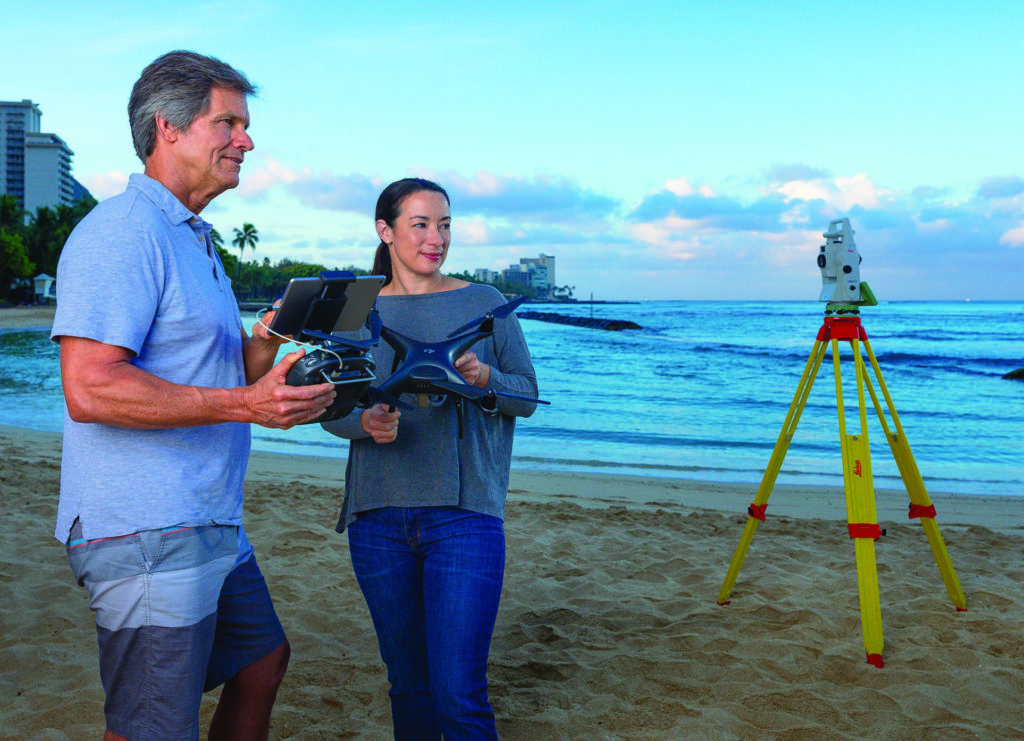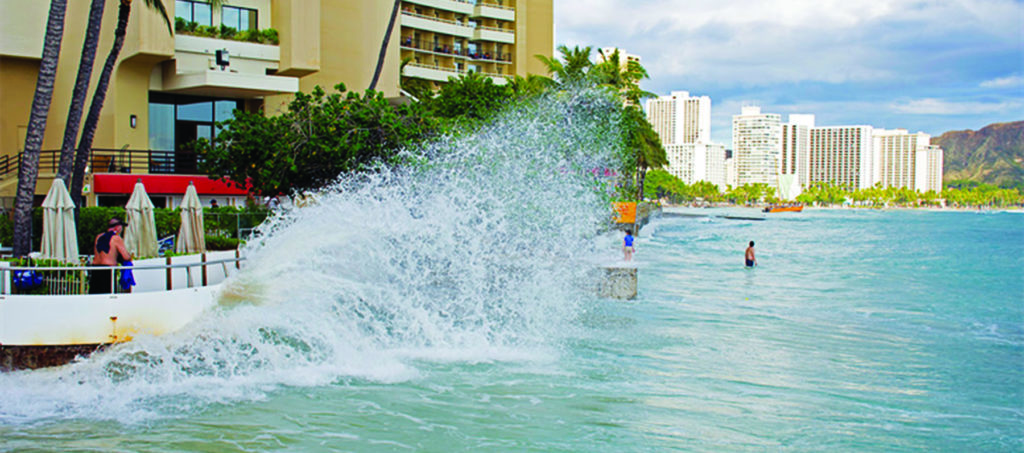Leading UH Mānoa’s Climate Change Efforts
Sea level rise, loss of coral reefs, stress on freshwater, more days with extreme heat, more floods and more droughts. These are some of the most pressing impacts that the Fourth National Assessment finds for Hawai‘i.
With the effects of climate change, achieving sustainability and resilience has taken on new meanings and greater urgency. Past practices and tradeoffs on the environment now come with sharp edges. Author Naomi Klein best summed up the world’s plight in the 2014 title This Changes Everything.
The average person in Hawai‘i contributes fifteen metric tons of carbon dioxide equivalent into the atmosphere each year, which is about three times more than the global average. A more sustainable future means putting into focus the variety of pathways that embrace deep decarbonization, and choosing those that most support people and communities. A resilient community is one that endures in the face of shocks and stressors. And regardless of how much greenhouse gas emissions are reduced today, what has already been contributed will have impacts for years to come.
In an effort to enable multi-disciplinary research and curricular experiences for students interested in addressing complex social, technical and environmental problems associated with climate change, the University of Hawai‘i at Mānoa (UH Mānoa) launched the Institute for Sustainability and Resilience (ISR) in 2018 to promote environmental sustainability and community resilience in Hawai‘i through the organization of sustainability-focused curricula and solution-oriented approaches to research and community partnerships. The institute also assists in the implementation of the broader University of Hawai‘i System (UH System) sustainability policies in collaboration with the UH Office of Sustainability.

“The depths of expertise and passion amongst faculty in sustainability and resilience at the University of Hawai‘i at Mānoa is amazing,” said ISR Director Makena Coffman, a professor of Urban and Regional Planning at UH Mānoa and chair of the City and County of Honolulu’s Climate Change Commission. “All parts of campus have approaches and solutions to offer in regards to the environmental crises we are facing, from curriculum to research. I am excited to have the opportunity to synergize and leverage these efforts through ISR.”
The Institute for Sustainability and Resilience serves as the mechanism to identify and cross-list sustainability and resilience-focused curricula at UH Mānoa, currently numbering eighty courses across twenty seven academic departments. These courses help students to develop an understanding of the interconnectivity of human and natural systems, with an emphasis on critical thinking in search of solutions. Class syllabi are vetted by a curriculum committee composed of faculty from the College of Engineering, College of Natural Sciences, College of Social Sciences, College of Tropical Agriculture and Human Resources (CTAHR), the Hawai‘inuiākea School of Hawaiian Knowledge, and the School of Ocean and Earth Science and Technology (SOEST). In practice, what the cross-list means is that students at UH Mānoa can now easily find and access sustainability focused courses, not only through the course catalog, but also through additional advising that helps break down disciplinary silos in the delivery of urgently-needed learning opportunities.
Universities across the globe have been undergoing structural changes to more proactively engage in the translation of knowledge for decision-making to address problems like climate change. With an articulated campus program like ISR serving as a facilitator, communicator and focal point for new cross-campus opportunities, UH Mānoa has gained membership in prestigious national and international programs like the United Nations Sustainable Development Solutions Network and Northeastern University’s Global Resilience Research Network.
To encourage participation from across campus and the community at large, ISR co-sponsors a weekly public workshop. Last year it was on climate change adaptation and featured topics ranging from wildfires to water resources, sea level rise, innovation, soil carbon sequestration and disaster resiliency. Other co-sponsors of the year-long program were the UH Economic Research Organization, Sea Grant College Program, CTAHR and the Pacific Island Climate Adaptation Center.
“It is a credit to our faculty and students that UH Mānoa has emerged as an international leader in virtually every facet of the broad disciplines of sustainability and resilience,” said UH Mānoa Provost Michael Bruno. “The ISR brings together the great research and outreach already going on at UH so that we can contribute strongly to sustainability and resilience efforts in Hawai‘i and beyond.”

